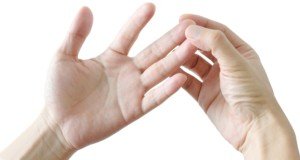
If that twitching middle finger is beginning to worry you sick because you googled it and a bunch of ALS sites popped up, here are answers from a doctor who is double board certified: neurology and sleep medicine.
And sleep may factor into the twitching of your middle finger, but first, what would cause one’s middle finger to repeatedly twitch in the first place?
“Twitching of middle finger — this may have been due to overuse (hopefully you’re not flipping people the bird all day!) or muscle strain,” begins Joseph Krainin, MD, who is board certified in sleep medicine and neurology.
Dr. Krainin continues, “If you’re, say, writing all day and under stress so you’re really pressing hard on that pen with your middle finger, it might have been the trigger for the twitching.
“This issue may be exacerbated if you’re not sleeping well.” A good, healthy-feeling day begins with a good night’s sleep that precedes it.
As Dr. Krainin points out, overuse and pressing can lead to twitching. Ask yourself if recently, your middle finger has been subjected to an unusual degree of pressure.
This can actually occur during sleep if your butt is on top of your fingers, and the middle one is getting the brunt of the pressure.
Pressure can also arise during a weightlifting workout. For example, some people will apply a very hard grip to a seat while doing a seated strength training move.
Do your fingers grip the underside of the seat while you perform heavy leg extensions?
What about the placement of your middle finger while you’re straining out the heavy seated bench dips?
Do you do rock-wall climbing? That’s another activity that can over-work the middle finger.

Shutterstock/Nejron Photo
So can handy projects around the house or carrying luggage.
One of the leading causes of benign muscle twitching (or fasciculations) is exercise and overuse, which often go hand-in-hand.
To put it simply, the nerves just get over-worked and remain in a residual excited state.
The middle finger is no exception to this common and harmless phenomenon.
Middle Finger Twitching and ALS “If it is persistent or you notice that the twitching spreads, then it’s time to talk to your doctor,” says Dr. Krainin.
If there is accompanying weakness, this definitely means you need to see a physician.
But don’t let your imagination become a runaway train: Don’t start imagining the weakness.
When weakness is imagined this is called perceived weakness.
If you had difficulty unscrewing a never-opened jar of apple sauce, don’t jump to the conclusion you might have ALS.
If on the other hand you suddenly don’t have the strength to lift the jar out from the top shelf of your refrigerator…this is concerning, but not necessarily caused by ALS.
In 2013 Dr. Krainin was elected a Fellow of the American Academy of Sleep Medicine, an honor reserved for sleep doctors who’ve made significant contributions to the field in education, research and service.
 Lorra Garrick has been covering medical, fitness and cybersecurity topics for many years, having written thousands of articles for print magazines and websites, including as a ghostwriter. She’s also a former ACE-certified personal trainer.
Lorra Garrick has been covering medical, fitness and cybersecurity topics for many years, having written thousands of articles for print magazines and websites, including as a ghostwriter. She’s also a former ACE-certified personal trainer.
.










































